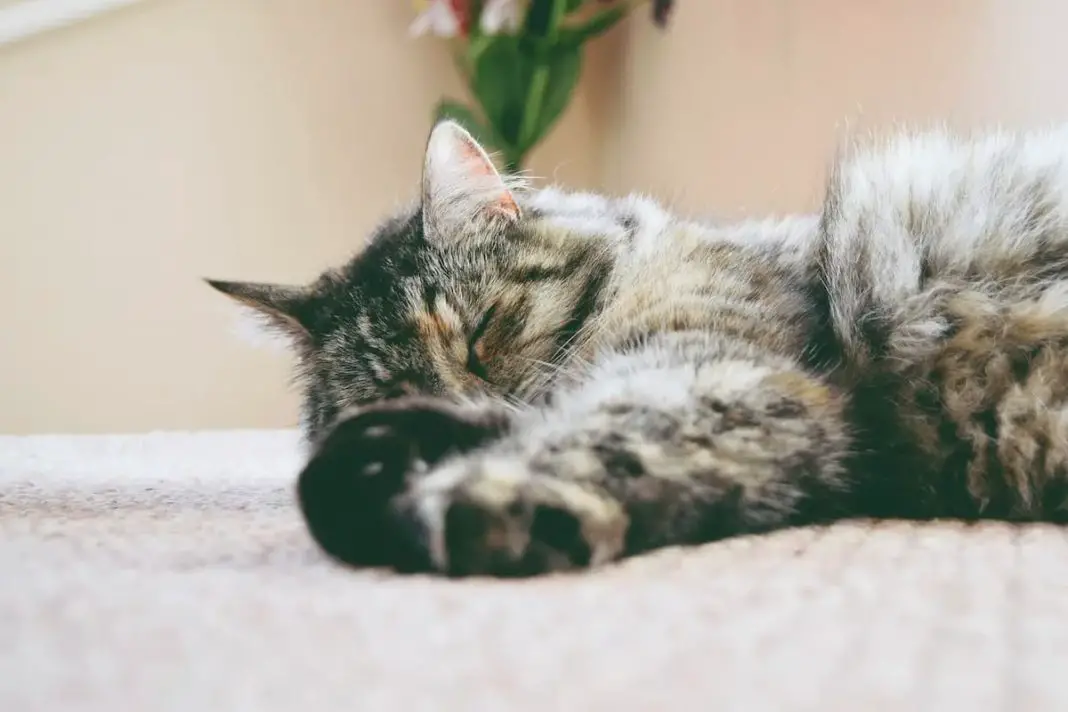Perhaps you had been relaxing on the couch or maybe using your laptop on the sofa with your cat lying beside you, sleeping comfortably. All of a sudden, your cat starts hissing. Your cat seems startled, and both you and your cat are wondering what’s going on! How did your cat go from sleeping to waking up hissing? Should you be worried? Did your cat have a nightmare?
This is somewhat common, as many cat owners can experience this. The good news is that your cat is just fine, and there’s no cause for worry when you see this behavior. It’s highly likely your cat had a nightmare! Sometimes, just like for humans, some dreams are the opposite of cheery and joyful. Yes, it is believed that even cats can have nightmares and bad dreams.
Why Did My Cat Wake Up Hissing?
If your cat wakes up, your cat may have been in a deep sleep and might have even been having a nightmare. Experts suggest that when a cat is in REM sleep, it might cause them to move their head like it’s watching something. Research has shown that cats may dream about things that have recently happened, and can even have nightmares, though experts know little about the extent of those nightmares.
As your cat dreams, you may have seen them twitching, stretching, snoring, and hissing. These kinds of reactions are usually caused by signals in your cat’s brain that happen during the dream. For example, if your cat has recently had a frightening experience, like being chased by a dog, it may be dreaming about that, causing it to wake up startled.
Why Cats Have Bad Dreams (Why You Can’t Help)
Experts know that cats process stress through their dreams as we do. When you see your cat responding to something while sleeping, they’ve probably had a nightmare. The reasons can vary, including frightening experiences from either the previous day or the distant past and physical pain.
In this article, we’ll cover what causes bad dreams in cats. That way, you’ll know whether to do something about them or to let your cat overcome them on its own.
Reasons Why Cats Have Bad Dreams
Like other mammals, cats experience can experience bad dreams during the REM sleep stage, as the hippocampus processes unpleasant past events. You can see your cat looking distressed as they sleep, perhaps accompanied by crying, hissing, twitching, and swiping claws.
Experts believe that nightmares can even be a positive experience as they clean the memory from the cat’s mind, letting it live without fear and stress of horrible events in the past. Therefore, it’s always recommended to let your cat sleep without disturbing it.
Some common reasons for bad dreams in cats include:
Previous Frightening Experiences
Just like humans, cats can have bad dreams as a result of stress and anxiety. An anxious cat can often relive previous disturbing experiences while sleeping, including:
- Loud, sudden, and unexpected noises
- Grief over the owner’s long absence
- Scolding
- Starvation or inadequate and untimely feeding
- Unsanitary living conditions
- A fall while jumping
- Frightening conflict with other animals
Abandonment
Although many people believe that cats are uninterested in creating deeper emotional connections with their owners, this isn’t true. You may have read about examples of cats that have suffered after their people abandoned them.
In situations like this, the cat probably recalls the horror of being left alone in its dreams. The only way to prevent these feelings in the future is to establish a routine and show your cat what to expect from you.
Bullying And Conflict
Sometimes cats that are in a multiple pet household can suffer from bad dreams. One probable reason could be due to bullying.
An example would be a cat processing a dog’s harassment or conflict with another aggressive cat during its sleep time. Protecting the cat from further abuse can quickly solve the problem of nightmares.
Physical Pain
If you’re a cat owner, you already know how hard it is to determine whether your cat is in pain. Senior cats are talented of masking illness and physical discomfort for long periods of time.
However, they can still dream about their suffering and can experience bad dreams as a result. If they recur frequently, you should consider taking your pet to the local vet for a regular check.
Your Cat’s Age
Be aware that REM phases are more frequent in kittens and younger cats, so they’ll experience nightmares more often compared to adult cats. On the other hand, adults will usually sleep deeper, so you’ll rarely see them upset during sleep.
Unfortunately, a cat may become more unhappy and anxious if these bad experiences repeat. Bad dreams can appear continually as a result.
How Can We Be Sure That Cats Have Bad Dreams? What Do They Dream About?
The average adult cat sleeps for around sixteen hours a day. It’s impossible to be sure when they’re dreaming, but some evidence suggests it is the case.
For example, researchers have proved that animals have complex dreams and can recall past experiences while sleeping.
What Cats Usually Dream About
According to research, cats will occasionally show hunting-like behavior during the REM sleep stage, including arching their backs, hissing, and meowing. After many years of research, scientists have concluded that cats often dream about hunting.
The majority of researchers agree that cats also summarize their memories during sleeping and relive past experiences. In fact, it is believed that adult cats can dream about events that happened years ago, thanks to their impressive long-term memory capacity.
Finally, it’s believed that cats can dream about fantasies. This is the only one that isn’t directly connected with unpleasant experiences. However, fantasies will appear only in pleasant dreams.
Here are a few clear signs that a cat is dreaming about something unpleasant:
- It cries and twitches its face while breathing rapidly
- It thumps its tail, and its limbs twitch
- If you think that your cat is dreaming, you shouldn’t try to wake it up, regardless of how clear these dreams may seem disturbing for the cat.
What Should You Do When Your Cat Has A Bad Dream?
Many experts believe that there’s no need to worry about cats that have bad dreams too much. In many cases, cats will dream after a lousy experience and quickly recover after waking up. There’s no evidence to suggest that they dream about imagined events or things that have never happened.
In theory, protecting your cat from having bad dreams seems simple, and therefore, many owners may believe think that having a comfortable life and lack of bad experiences will prevent nightmares. Unfortunately, that isn’t the case.
The reality is that cats can memorize things that had happened years ago. Therefore, their brains will uncover previous bad memories that will probably provoke immediate nightmares.
Unfortunately, the horrible thing is that you actually can’t do anything to help your sleeping cat. The only thing you can do is to gently hug and comfort your cat after it has woken up.








